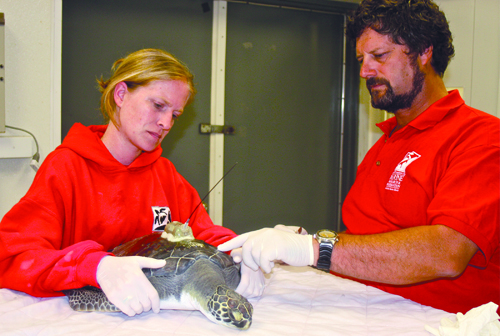Sea turtle lecture series under way in Riverhead

Program these digits into your phone: 631-369-9829.
That’s the number of the Riverhead Foundation for Marine Research and Preservation, and you never know when you’re going to need it.
That’s what James Sullivan of the New York State Marine Mammal and Sea Turtle program told a small group of attendees last week at the first of four cold-stunned sea turtle lectures being presented this month and next at Long Island Aquarium.
“You never know when you’re going to come upon a sea turtle, seal or another marine creature washed up on a beach,” Mr. Sullivan said. When that happens, you’ll need the number of the Riverhead Foundation, the only entity in New York state certified to rescue stranded marine animals.
Four species of sea turtle can wash up on any of Long Island’s beaches — Atlantic green, loggerhead, leatherback and Kemp’s ridley — and all are endangered.
Mr. Sullivan said at last Monday’s meeting — attended by about a dozen people — that the foundation is predicting this year will be a bad one for turtles, similar to 1995, when more than 70 were found.
“We’ve already seen more sea turtles this year than all of 2011,” he said. Last winter, though, was unusually mild.
Lecture attendees asked several questions about sea turtles, including how to identify the different types, which beaches they can wash up on, and how long they can survive in a cold-stunned state, as well as what to do after a turtle is found.
Cold-stunned sea turtles may appear to beachcombers as if they’re already dead, Mr. Sullivan said, stressing the importance of calling the foundation even in those cases.
“The sea turtles that get washed up have likely already lost movement in their extremities,” he said. “At this point, the blood is focusing on getting between the brain and heart and their respiratory and GI tracts have shut down.” This happens, Mr. Sullivan explained, when sea turtles that have traveled into the Sound or other inshore waters fail to leave before water temperatures cool to below 50 degrees Fahrenheit.
“This morning the water was 61.4 degrees, so we’re getting close,” he said.
Because turtles are cold-blooded reptiles, their bodies do not warm themselves but instead match the temperature of surrounding waters.
At 50 degrees, cold-stunning symptoms begin to hit smaller turtles first and then affect bigger ones.
“Eventually they just turn into a piece of driftwood, wash up on the beach and get deposited along the high tide line,” he said.
The rescue window for cold-stunned sea turtles, which can be found along any of Long Island’s beaches, is six to eight hours maximum from the time they wash ashore, Mr. Sullivan said.
Getting the turtle out of the wind and safe from predators, if possible, is as important to saving its life as is calling the foundation, he said. Equally important is not attempting to heat the turtle.
“If you can handle the turtle and they aren’t snapping, get them out of the wind and sheltered, but don’t turn on the heat in the car or inside because you can quickly send them into heat stroke,” he said. Those that remove turtles from the beach should keep them in a truck bed, unheated garage or shed until the foundation arrives.
The foundation’s process for safely warming up turtles takes hours, expertise and equipment, he said, including possible tracheal intubation if the respiratory system has completely shut down.
As the weather cools through autumn into the winter, the Riverhead Foundation is asking the public to comb the beaches and search for cold-stunned sea turtles over the coming months.
Mr. Sullivan said cold-stunned turtles can be incredibly hard to spot because they are often covered in barnacles and the same color as the seaweed deposited along the high tide line.
“We’ve had calls about a sea turtle and it’s taken four times up and down the beach to find it,” he said.
Rick Kedenburg, with the North Fork Audubon Society, said in an interview after the meeting that he hopes people will use their recreational walks on the beach to do some good by calling 369-9829 if they should see a marine animal in need.
“It’s very important to carry the number with you and call the Riverhead Foundation if you see a stranded turtle or anything else,” he said.
Attend one of the upcoming cold-stunned turtle lectures in the Peconic Room at Hyatt Place East End, 451 E. Main St., Riverhead, to learn more about how you can help.
Sunday, Oct. 28, 1:30 p.m.
Tuesday, Nov. 13, 6:00 p.m.
Sunday, Nov. 25, 1:30 p.m.








